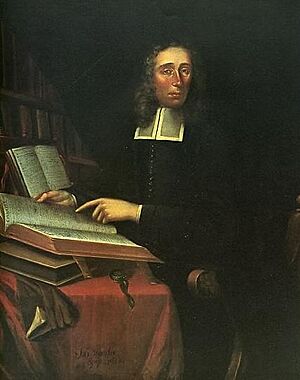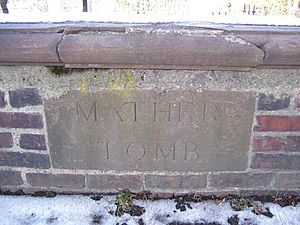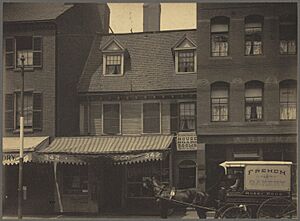Increase Mather facts for kids
Quick facts for kids
Increase Mather
|
|
|---|---|

Mather in 1688, when he was in London. Portrait by John van der Spriett.
|
|
| President of Harvard College (title varied) | |
| In office 1685–1701 |
|
| Preceded by | John Rogers |
| Succeeded by | Samuel Willard (acting) |
| Personal details | |
| Born | June 21, 1639 Dorchester, Massachusetts Bay Colony, British America |
| Died | August 23, 1723 (aged 84) Boston, Province of Massachusetts Bay, British America |
| Spouses | Maria Cotton Ann Cotton |
| Children | Cotton Mather |
| Education | Harvard College (AB) Trinity College Dublin (MA) |
| Occupation | Minister and author |
| Signature | |
Increase Mather (born June 21, 1639 – died August 23, 1723) was an important Puritan leader in New England. He was a minister and also served as the president of Harvard College for twenty years. He played a big role in the government of the Massachusetts Bay Colony, especially during the time of the famous Salem witch trials.
Contents
Early Life and Family
Increase Mather was born in Dorchester, in the Massachusetts Bay Colony. His parents, Richard and Kathrine Mather, had moved from England. They were part of the Great Migration, where many Puritans left England. They came to America because they did not agree with the Church of England.
Increase was the youngest of six brothers. Three of his brothers also became ministers, like their father. His unique first name, "Increase," meant the "increase" or growth that God brought to the country around the time he was born.
Education and Early Career
In 1651, when he was 12, Mather started studying at Harvard College. He earned his first degree, a Bachelor of Arts, at age 17 in 1656. After that, he began training to become a minister.
He then traveled to Ireland to study at Trinity College, Dublin, where he earned a Master of Arts degree. During this time, he worked as a minister for the government under Oliver Cromwell. After Cromwell died, Mather felt it was safer to return to Boston, which he did in 1661. Years later, Harvard gave him the first honorary degree in the New World, making him a Doctor of Sacred Theology in 1692.
Life in Massachusetts
When Increase Mather returned to Massachusetts in 1661, he married Maria Cotton. She was his step-sister because his father had married Maria's mother. In 1663, their son, Cotton Mather, was born. Cotton also became a very famous minister.
Increase Mather became the minister of the North Church in Boston. He stayed in this important role for the rest of his life. In 1676, he wrote a book called A Brief History of the War with the Indians in New-England. This book described King Philip's War, a major conflict at the time.
Leading Harvard College
Increase Mather was the president of Harvard College from 1681 to 1701. His official title changed a few times during his leadership. He was first an Acting President, then a Rector, and finally the President.
Even though he was often away from the college, he made some important changes. He brought back the teaching of Greek and Hebrew. He also made sure students attended classes regularly and lived on campus. He stopped older students from playing mean tricks on new students, which was called "hazing."
Involvement in Politics
During Mather's time, religion and government were closely connected. His first direct involvement in politics happened when King James II of England tried to control the New England governments. In 1686, King James took away the special document, called a Charter, that gave Massachusetts its rights. He created a larger area called the Dominion of New England.
This Dominion was led by Edmund Andros, who was not popular with the Puritans. Andros ruled very strictly. He even took over a Puritan church for a short time for Anglican services.
Mather strongly opposed these changes. He traveled to London to ask the King to restore the old charter. While in London, he wrote articles to gain public support for his cause. These included A Narrative of the Miseries of New-England (1688) and A Brief Relation for the Confirmation of Charter Privileges (1691).
After the Glorious Revolution in England, King James II was overthrown. Andros was also arrested in Boston. A new charter was given to the colony in 1692. This new charter gave the colony more home rule (self-government) and allowed more people to vote. Mather helped choose William Phips to be the new Royal Governor. They returned to Massachusetts together in 1692.
The Salem Witch Trials
In 1681, Increase Mather started working on a book about unusual events, which he called "illustrious providences." He asked other ministers to share their stories. His book, Remarkable Providences, was published in 1684. It showed his belief in the real power of witchcraft.
In November 1692, during the Salem witch trials, Mather published another book called Cases of Conscience Concerning Evil Spirits. In this book, he defended the judges and the trials. However, he also included words of caution, perhaps because people were starting to question the trials. He mentioned attending the trial of George Burroughs, a fellow minister.
Later, Mather's connection to the trials was criticized by some. He was mentioned in a book by Robert Calef called More Wonders of the Invisible World. It is said that Increase Mather burned Calef's book in Harvard Yard.
Later Life and Passing

In 1715, after his first wife Maria passed away, Increase Mather married Ann Cotton. She was the widow of his nephew.
Mather owned a slave named Spaniard.
In 1722, Mather became very ill and was confined to his bed. He passed away on August 23, 1723, in Boston, at the age of 84. He was buried in Copp's Hill Burying Ground.
Strong Beliefs
Throughout his life, Increase Mather was a very strong Puritan. He believed in strict religious rules and opposed anything that went against his faith. He thought people should not work unnecessarily on Sundays and should avoid fancy clothing.
He believed that God showed his approval or disapproval through everyday events, like the weather, political situations, or natural disasters. He often gave powerful sermons, called "jeremiads," to encourage people to live morally. He wanted government officials to enforce public morality.
When he was president of Harvard, he worked to keep Puritan strictness. He opposed any ideas that seemed to relax Puritan rules.
Portraiture
A portrait of Increase Mather can be seen in the Middle Common Room of Mansfield College, Oxford.
See also
 | Calvin Brent |
 | Walter T. Bailey |
 | Martha Cassell Thompson |
 | Alberta Jeannette Cassell |


